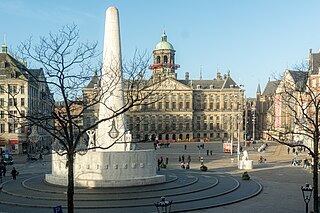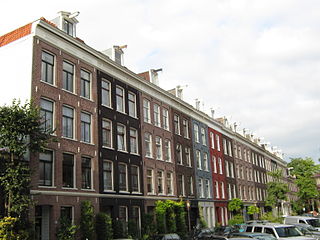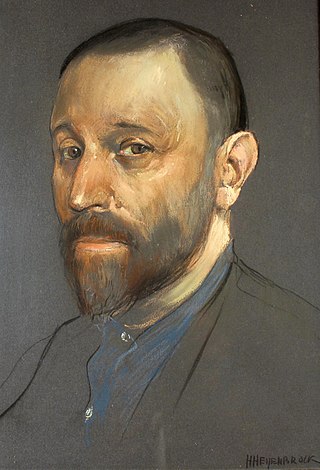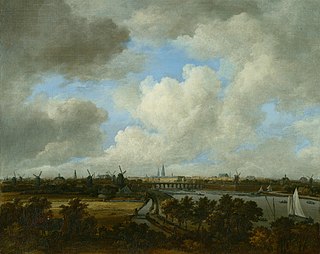
Amsterdam is the capital and most populated city of the Netherlands. It has a population of 921,402 within the city proper, 1,457,018 in the urban area and 2,480,394 in the metropolitan area. Located in the Dutch province of North Holland, Amsterdam is colloquially referred to as the "Venice of the North", for its large number of canals, now a UNESCO World Heritage Site.

Amstelveen is a municipality and city in the province of North Holland, Netherlands, with a population of 92,353 as of 2022. It is a suburban part of the Amsterdam metropolitan area.

The Royal Concertgebouw is a concert hall in Amsterdam, Netherlands. The Dutch term "concertgebouw" translates into English as "concert building". Its superb acoustics place it among the finest concert halls in the world, along with Boston's Symphony Hall and the Musikverein in Vienna.

Dam Square or the Dam is a town square in Amsterdam, the capital and most populated city of the Netherlands. Its notable buildings and frequent events make it one of the best-known and most important locations in the city and the country.

Ouderkerk aan de Amstel is a town in the province of North Holland, Netherlands. It is largely a part of the municipality of Ouder-Amstel; it lies about 9 km south of Amsterdam. A small part of the town lies in the municipality of Amstelveen. It is connected to Amsterdam by the river Amstel. There is another village called Ouderkerk in South Holland, Ouderkerk aan den IJssel.

The Royal Asscher Diamond Company was founded in 1854 by the Asscher family of gemcutters. The company is responsible for cutting some of the most famous diamonds in the world including the 2nd largest diamond ever found. Its headquarters still stand at its original location Tolstraat 127 in Amsterdam, the Netherlands. The company also has regional headquarters in New York City and Tokyo.

Gerrit A. van Arkel was a Dutch architect who designed many of Amsterdam's most prominent Jugendstil buildings.

The Openbare Bibliotheek Amsterdam is an organisation of public libraries in Amsterdam, Diemen and Ouder-Amstel in the Netherlands. The first library opened in 1919 at the Keizersgracht in Amsterdam. As of 2018, the OBA had 26 branch libraries, 177,000 members, and 1.3 million objects in its collection.

Eye Filmmuseum is a film archive, museum, and cinema in Amsterdam that preserves and presents both Dutch and foreign films screened in the Netherlands.

Amsterdam Muiderpoort is a railway station in the east of Amsterdam. It was reopened on 15 October 1939 after being first opened in 1896. It is located 4 km southeast of Amsterdam Centraal. At this station the Amsterdam–Arnhem railway and the Amsterdam–Zutphen railway split, with the two parts of the station separated (keilbahnhof). The western part is the Amsterdam Centraal to Utrecht Centraal line. The eastern part is the Amsterdam Centraal to Amersfoort Centraal line. The station is operated by the Nederlandse Spoorwegen.

The Amsterdam City Archives preserves documents pertaining to the history of Amsterdam and provides information about the city. With archives covering a shelf-length of about 50 kilometres, the Amsterdam City Archives is the largest municipal archive in the world.

Abraham Asscher was a Dutch Jewish businessman from Amsterdam, a politician, and a leader of his community who attained notoriety for his role during the German occupation of the Netherlands (1940–1945).

De Pijp is a neighbourhood of Amsterdam, Netherlands. It is located directly south of Amsterdam's city centre and it is part of the borough Amsterdam-Zuid, in a part of the city known as the Old South. It is served by De Pijp metro station. Most streets in De Pijp are named after Dutch painters, like Jan Steen, Frans Hals, Ruysdael and Vincent van Gogh. The three districts composing the area are Oude Pijp, Nieuwe Pijp and Diamantbuurt.

The Diamantbuurt is a neighborhood of Amsterdam, The Netherlands. It was built in the 1930s. It has streets named after precious stones: Diamantstraat, Robijnstraat, Saffierstraat, Smaragdstraat, Topaasstraat and Granaatstraat. These days the Diamantbuurt includes the area enclosed by the Tweede van der Helststraat, Karel du Jardinstraat, Henrick de Keijserplein, Tolstraat, Amstel and Amstelkanaal. It has many special buildings and monuments, like social housing in the Amsterdam School style of architecture.

Rivierenbuurt is a neighbourhood of Amsterdam, Netherlands. The neighbourhood is situated in the eastern part of the borough of Amsterdam-Zuid, bordered by the river Amstel to the east, the Boerenwetering canal in the west, the Amstelkanaal in the north and the A10 motorway in the south. In 2013, the Rivierenbuurt had approximately 28,400 residents.

Herman Heijenbrock, was a Dutch writer, painter, pastel draughtsman, and lithographer. He founded the "Museum van den Arbeid" in 1923, which later became NEMO Science Museum.
The following is a timeline of the history of the municipality of Amsterdam, Netherlands.

View on the Amstel from Amsteldijk is an oil on canvas painting by the Dutch landscape painter Jacob van Ruisdael. It is an example of Dutch Golden Age painting and is now in the collection of the Amsterdam Museum.

The Berlagebrug is a bascule bridge over the river Amstel in Amsterdam, Netherlands. The bridge was commissioned by the Amsterdam municipality and designed by engineer Cornelis Biemond (1899-1980) and architect Hendrikus Petrus Berlage (1856–1934); it was named after the latter. It was constructed from 1926 to 1931 and officially opened on 28 May 1932. It has been designated as a Rijksmonument since 11 May 2008. The bridgekeeper's house carries the address Amsteldijk 134.
The following is an alphabetical list of articles related to Amsterdam. Amsterdam is the capital city of the Netherlands.



















